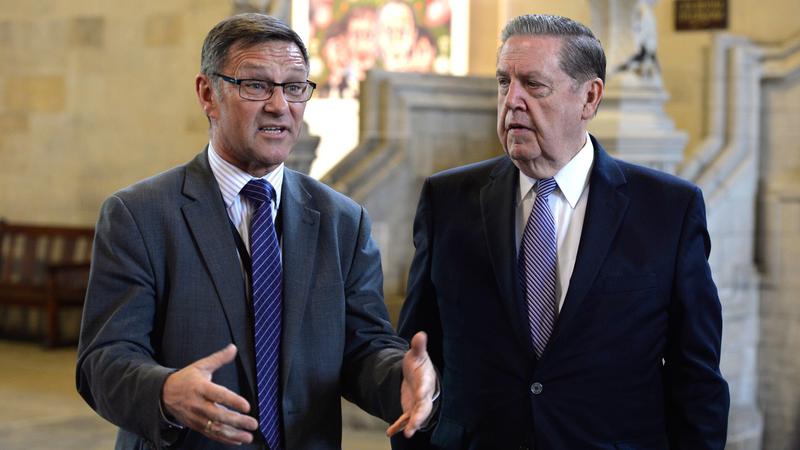With religious conflicts growing throughout the world, Elder Jeffrey R. Holland, an apostle in The Church of Jesus Christ of Latter-day Saints, addressed the All-Party Parliamentary Group (APPG) on Foreign Affairs in the House of Lords at the UK Parliament Wednesday, June 10, 2015, on how humanitarian aid can help.
Downloadable 1080p HD SOTs, B-roll, audio and time lapse for journalists
He followed Dr. Rowsch Shaways, deputy prime minister of Iraq, who also addressed the gathering, along with Dr. Ali Nasser Muthanna from AMAR International and Sharon Eubank, the Church's director of Humanitarian Services.
"We all long for the day when swords will be beaten into plowshares and spears into pruning hooks, but unfortunately religiously related violence is increasing, not decreasing, as we move into the 21st century,” Elder Holland told those gathered, including several members of Parliament. “These conflicts have led to humanitarian crises of staggering proportions around the world. The need to help remains enormous.”
The APPG on Foreign Affairs, an informal group where members of Parliament and leaders of faiths, charities and corporations examine issues of foreign policy, hold meetings like the one today to stimulate wider policy discussion amongst Parliamentarians. Addressing the meetings is an honor as they play a key role in the workings of the British government.
“I invited Elder Holland to come to the House of Lords today to meet with a number of my fellow peers — members of the House of Lords,” said the APPG on Foreign Affairs chair Baroness Emma Nicholson in an interview. “I want him to share his deep reservoir of knowledge and understanding — his heart, his head and his wisdom. My colleagues here on all sides of the House work mightily to help people and are always looking for knowledge and ways that we can do more.”
| Temple Square is always beautiful in the springtime. Gardeners work to prepare the ground for General Conference. © 2012 Intellectual Reserve, Inc. All rights reserved. | 1 / 2 |
Speaking of the suffering caused by conflict, Elder Holland said, “Because considerable portions of these situations are caused by those espousing one kind of religious belief or another (as tragically misapplied as that belief may be), then it only seems right that others of equal but more constructive religious conviction ought to help remedy these situations and set right what has gone wrong. The Church of Jesus Christ of Latter-day Saints sees its efforts at humanitarian aid in that light.”
Elder Holland outlined the advantages religious groups have in providing relief in these situations, including the meaning and consolation people impacted find in their religious practice and the religious organizations’ ability to establish trust and conversation and transcend national boundaries and unite disparate constituencies. Religious organizations can be powerful agents for tolerance, pluralism and conflict management and can empower people by providing theological support against injustice, he explained.
“By appealing to one’s deepest values, religions and religious organizations have a unique capacity to motivate people and, at the same time, cultivate attitudes of forgiveness, reconciliation, and a willingness to strive yet again for the ideal in their personal lives and in society. To miss this positive influence of religion where there is conflict would be to miss much — I would say too much,” Elder Holland said. “Because of our religious convictions — convictions grounded in the command to love God and our neighbor as ourselves — we sponsor humanitarian relief programs.”
"LDS Charities is magnificent," Baroness Nicholson said. "I can't tell you how much I admire this massive system that has been set up, purely through charity. Both organizations function from exactly the same wellspring of the common good and the deep desire to give everyone an opportunity to take care of their own affairs — to not just survive but have a future. That's why I'm really happy with this partnership."
As the founder and chair of AMAR, an international charity that helps communities in the Middle East faced with conflict, Baroness Nicholson has developed a close relationship with LDS Charities, the humanitarian arm of The Church of Jesus Christ of Latter-day Saints.
“There’s so much work that has to be done, there’s so much suffering that it isn’t possible for any one organization to do it,” said Sharon Eubank in an interview.
The meeting provided an opportunity for Church officials to share their insights and knowledge gained through administering efforts to relieve suffering around the world. It was the first time a leader of The Church of Jesus Christ of Latter-day Saints has addressed a gathering in the Houses of Parliament. In the meeting Baroness Nicholson thanked Elder Holland for his “magnificent speech.”
“These members of Parliament, particularly in the House of Lords, are interested in what we’re doing,” Elder Holland said in an interview. “They’re doing many of these same kind of things, and I believe now they see us as a significant partner, a significant contributor, and I think they want to build that relationship.
"My particular message was that we had a distinctive advantage as a religion organization, as a church, believing what we believe about the fatherhood of God and the brotherhood and sisterhood of men and women," Elder Holland said in an interview after the meeting. "And that we were not only obligated but empowered in the gospel of Jesus Christ to reach out, to care for the poor, to clothe the naked, to feed the hungry."
Visit MormonNewsroom.org to learn more about LDS Charities and its programs.
